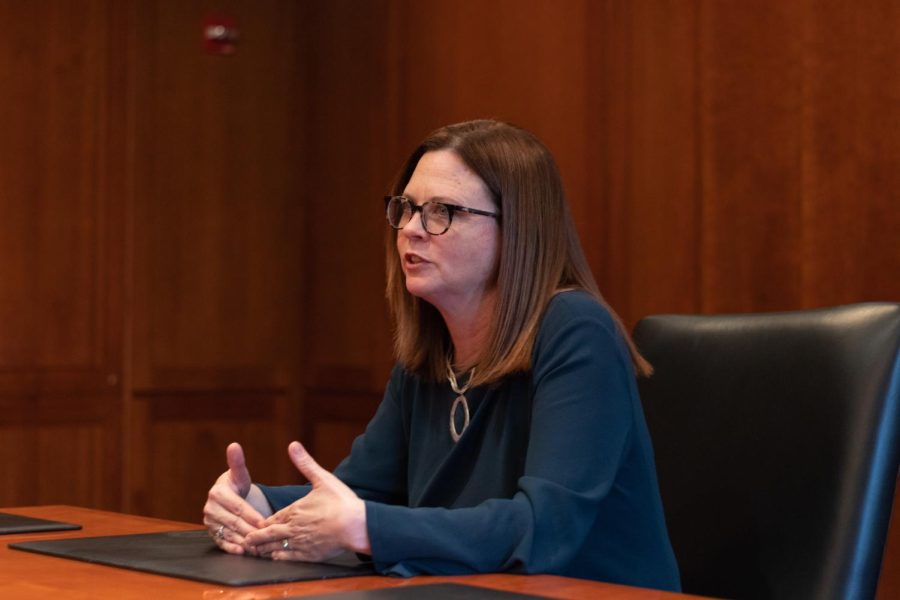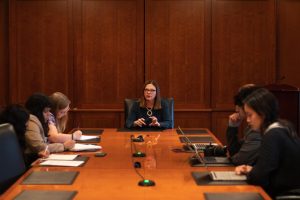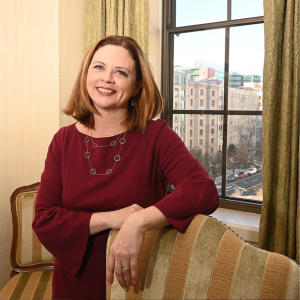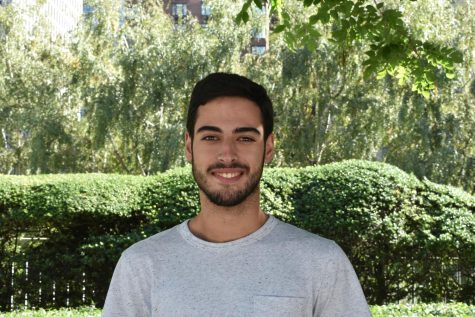Tetlow Reflects on First Year as President
Tetlow discussed connections between the projected tuition increase and calls for compensation from unions, as well as hopes to further connect with students
Tetlow discussed her first year challenges and future possibilities.
March 24, 2023
University President Tania Tetlow, J.D., discussed the challenges in her first year as Fordham’s president, as well as her hopes for the future.
The press conference, which was held on March 1, was organized by Bob Howe, assistant vice president for communications and special adviser to the president. Editors from both The Observer and The Ram were invited to speak with the president regarding matters impacting students and staff.
The university announced that Tetlow would be the first woman and layperson president in Fordhams history on Feb. 10, 2022. She previously served as president of Loyola University New Orleans beginning August 2018, where she was also the first non-Jesuit president. Prior to her tenure at Loyola, she was the senior vice president and chief of staff at Tulane as well as the associate provost for international affairs.
When discussing the financial state of the university, Tetlow said that the university will increase the cost of tuition for the 2023-24 academic year.
Tetlow met with student press last year, on Feb. 23, 2023, to discuss the presidential transition, assuming office as the university’s first laywoman president and her ambitions once she is inaugurated.
This year, the president touched on these key points:
- An increase in tuition for the 2023-24 academic year
- Mass unionization efforts
- Distribution of contraceptives on campus and Title IX initiatives
- Student reports of feelings of unequal access in resources and course offerings between the Rose Hill and Lincoln Center campuses
- Hopes of connecting more with students and the Fordham community
Increase in Tuition Rate
When discussing the financial state of the university, Tetlow said that the university will increase the cost of tuition for the 2023-24 academic year. She declined to share the exact percentage by which tuition will be raised and did not specify any plans to increase room and board fees. Tetlow attributed the tuition raise to the lasting impacts of the COVID-19 pandemic’s impact on the university’s finances, as well as the rising inflation rates.
“The inflation that is hitting all of you and your families as a kick in the shin is hitting the university,” she said. “We constantly remind ourselves that every penny we spend at this university represents the life savings of your families.”
Tetlow highlighted that the university did not raise tuition for the 2021-22 academic year due to the COVID-19 pandemic’s impact on families. For the 2022-23 academic year, Fordham had a 4% tuition increase as a way to compensate for the lower tuition cost the previous year.
The president also mentioned higher staff compensation as a reason for increasing the tuition rate. She specifically noted the recent contract agreement between the university and Fordham Faculty United (FFU), a union representing nontenure-track professors at Fordham. The contract stipulates higher wages as well as health benefits for adjunct instructors.
“We also have a lot of pressures on compensation, a desire for employees who have been hit by inflation in the way that you have as well wanting raises that are commensurate with that,” she said.
“We still function within a marketplace: I can’t say to the highest paid faculty ‘I need you to cut your salaries to pay others,’ or I lose them.” University President Tania Tetlow, J.D.
Tetlow noted that the university would support students by restraining “significant funds” for families who cannot accommodate the tuition increase.
Union Activity
The president also addressed both the multiple unionization efforts that have occurred in the 2022-23 academic year, with FFU threatening to strike at the beginning of the spring semester, the Fordham Graduate Student Workers (FGSW) union continuing their bargaining sessions with the administration, and the Fordham Rose Hill Resident Assistant (RA) union announcing its formation on Feb. 1.
Regarding FFU’s proposed strike at the beginning of the spring semester, Tetlow acknowledged that the treatment of adjunct faculty in the academic marketplace is “difficult.” She added that the university had to consider all professor standings when making these budget decisions, as they could not lower the base pay for others.
“There are consequences to trying to be more egalitarian here,” she said. “We still function within a marketplace: I can’t say to the highest paid faculty ‘I need you to cut your salaries to pay others,’ or I lose them.”
She stressed that she wants to ensure that members are voting for “the way of the students,” and if the outcome is in favor of a union, then Fordham “will absolutely have a union.”
Tetlow also addressed the university’s decision to not recognize the Fordham Rose Hill RA Union when they delivered their petition on Feb. 1. She explained the choice was made because the administration was unable to understand the type of union the RAs were proposing — specifically whether it included both campuses or was confined to Rose Hill. She stressed that she wants to ensure that members are voting for “the way of the students,” and if the outcome is in favor of a union, then Fordham “will absolutely have a union.”
The Rose Hill RAs held an election on March 21 in the Joseph M. McShane, S.J. Campus Center from 2 p.m. to 6 p.m. to vote for their union. The result of the vote was 47 in favor of unionization with 19 in opposition, a 71% majority. Approximately 69% of the Rose Hill RAs voted.
The president also addressed the mobilization from FGSW and the postage of various flyers around both the Lincoln Center and Rose Hill campuses. She added that she is open to continuing negotiations at the bargaining table.
“I hope that they will do that with the understanding that we have the same goal of supporting our students,” she said about future negotiations with FGSW.
Tetlow also spoke on how the university’s religious affiliation impacts student life and shared that the doctrine of the Church still dictates policies, such as the prohibition of the distribution of contraceptives, throughout the university.
She acknowledged the importance of union efforts both in a collegiate setting and nationally as an opportunity for institutions and corporations to analyze and ameliorate worker unrest and dissatisfaction.
“The current social and political climate represents a moment for union employees and workspaces nationally to examine their collective power and grapple with fundamental inequalities within the American economy,” she said.
Contraception and Title IX Efforts
Tetlow also spoke on how the university’s religious affiliation impacts student life and shared that the doctrine of the Church still dictates policies, such as the prohibition of the distribution of contraceptives, throughout the university. According to the student handbook, while the personal possession of contraceptives, contraceptive devices and birth control in any form is permitted, distribution of such preventive measures on Fordham property or university-sponsored events as well as utilizing university resources is forbidden.
She explained that the provisions at the university will remain so long as the Catholic Church’s doctrine regarding the distribution of contraceptives is unchanged.
She highlighted that she is currently focused on investigating current protocols and processes for reporting and filing Title IX complaints, prioritizing preventive measures that reevaluate how community members respond to sexual misconduct, and considering the overlap of Title IX and race, equity and inclusion.
Tetlow also shared that her personal philosophy on the use of contraceptives differs from that of the Catholic church. She added that she believes it is a policy that most American Catholics also don’t believe in.
“I am happy to tell you publicly that it is one that I disagree with, and I hope the Church changes its mind,” she said.
The president added that she would have a larger problem with the policy if the university was not located in a major metropolitan city where contraception is a more readily available resource than in rural areas.
Tetlow also discussed initiatives on her agenda to improve Title IX efforts, which she was actively involved in reforming in her previous position as senior vice president and chief of staff at Tulane University from 2015 to 2018.
She highlighted that she is currently focused on investigating current protocols and processes for reporting and filing Title IX complaints, prioritizing preventive measures that reevaluate how community members respond to sexual misconduct, and considering the overlap of Title IX and race, equity and inclusion. Tetlow noted that much of her work is targeted at meeting with experts in the field and analyzing the university’s strengths and areas of improvement.
“This is one of those areas where we do not have the answers,” she said.
“There is a world where if Lincoln Center came first, everyone would be very jealous about the chance to be located in the center of Manhattan, but because the Lincoln Center campus came second, there is this feeling of being overlooked.” University President Tania Tetlow, J.D.
The president shared that universities tend to implement similar programs to one another without assessing their efficacy. As a result, she encouraged members of the university to lead conversations regarding Title IX and harness the creativity and ingenuity of the student body.
“It’s not that I have a cookie cutter program that I know will solve all the problems,” she said. “It’s trying to activate the people who do that work every day, to think bigger without sounding like I’m criticizing what they’re doing.”
Differences in Resources Between Two Campuses
In response to student complaints regarding disparities in course options and other amenities between the Lincoln Center and Rose Hill campuses, Tetlow shared that the raw data shows that the number of student support staff, such as University Health Services, Counseling and Psychological Services, and the Office of Residential Life, is proportional to the student body between both campuses.
“There is a world where if Lincoln Center came first, everyone would be very jealous about the chance to be located in the center of Manhattan, but because the Lincoln Center campus came second, there is this feeling of being overlooked,” she said.
While Tetlow generally labeled such claims as a matter of perspective, she explained that she cannot verify that this is true for all areas of the university.
She also noted that students may feel that the “grass is greener on the other campus,” but due to the location and nature of each one, students have the option to choose which experience they prefer and take advantage of the different resources at each.
In light of student frustrations related to unequal course offerings at the Lincoln Center campus which often requires students to travel to the Bronx, the president shared that the university is exploring initiatives to move majors or seminar style classes to only one campus. This would ultimately lead to fewer students having to make the commute to fulfill their major requirements.
She also noted that students may feel that the “grass is greener on the other campus,” but due to the location and nature of each one, students have the option to choose which experience they prefer and take advantage of the different resources at each. She added that those who realize they like the experience of the other campus better are able to apply to transfer to their preferred campus.
In regards to the oversubscription of students in residence halls at both campuses, but primarily at Fordham Lincoln Center, the president explained that COVID-19 resulted in an upheaval in the admissions market, compelling the university to accept far more applicants than there are available spots. She added that the university is currently working to “stick to its targets” and avoid another housing overflow.
“It’s not that we only take 2,500 students to fill 2,500 spots. We have to take far more than that and hope that just enough of you say yes, and not too many.”University President Tania Tetlow, J.D.
“It’s not that we only take 2,500 students to fill 2,500 spots. We have to take far more than that and hope that just enough of you say yes, and not too many,” she said.
Efforts To Engage With Students
When speaking with the undergraduate student press after she assumed her role as the university’s president-elect, Tetlow emphasized that she wanted to “spend an awful (lot of) time listening.” After a year in office, the president reflected on her efforts and initiatives to make herself more accessible to Fordham community members. she shared that given the size and scale of the campuses, she aims to increase her communications with students because she wants to connect with more individuals at each campus.
“I’m not at all satisfied with my ability to reach out to everyone, but those are the moments that fuel me, that’s what makes me happy,” Tetlow said.
She added that her goal is to reassure community members that although she is the university’s first laywoman president, Fordham’s Jesuit values remain steady.
She defined her moments interacting with the Fordham community as “some of her most rewarding” and some of her highlights included meetings with club leaders at both campuses, as well as orientation leaders and advisers during the first weeks of the fall semester.
Tetlow shared that in reflecting on her accomplishments this year, she is yet to enter “self-congratulatory mode.” She added that her goal is to reassure community members that although she is the university’s first laywoman president, Fordham’s Jesuit values remain steady. She also stressed that the aim of a Catholic institution is to foster both inclusion and a welcoming environment.
“We can be proudly Catholic, proudly Jesuit, without making others feel excluded because of that — that what we stand for is something bigger and broader,” she said.
“I am going to try my very best to do right by all of you and that this job is such a labor of love for me because of the students.” University President Tania Tetlow, J.D.
In an email sent from the Office of the President to members of the Fordham community on March 7, Tetlow announced initiatives to further direct efforts of engagement. She included a Google form to submit ideas with the assurance that her and her team will read each submission. The president has also scheduled office hours at both campuses where students can reserve a time to individually meet with her either in-person or virtually, and the gathering of a presidential student advisory council.
The president also included an invitation to a virtual student town hall which will be held on April 3 at 5 p.m. for both undergraduate and graduate students where university updates will be shared and attendees can ask questions.
“I am going to try my very best to do right by all of you and that this job is such a labor of love for me because of the students,” she said. “We are much more likely to get it right with the help from students.”

















